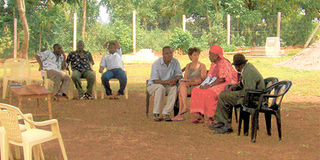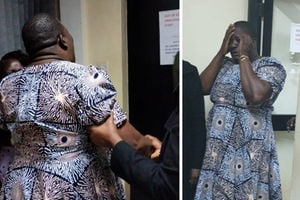A chat with the world’s most famous grandma

We dash from Lake Victoria Safari Village to make it to the ferry that runs like clockwork between Mbita and Luanda Kotieno on the shores of Lake Victoria.
Even a five-minute delay can mean a three-hour wait.
The ferry crossing is always the highlight of the journey, for the lake is beautiful, studded with tiny islets and edged by massifs of the Gembe and Gwassi, Homa Bay and Kendu Bay. We also watch out for hippos and the rich profusion of birds.
We dock at Luanda Kotieno and we’re on our way to visit the world’s most famous grandma, Mama Sarah Obama in the now famous Kogelo village.
Kogelo is only an hour’s drive from Luanda Kotieno and just a small detour on our way to Kisumu.
It’s the opportune time to visit the ancestral home of President Barack Obama of the United States of America.
We turn in at Ndori on the Kisumu-Bondo road, where the sign for the school named after the then Senator is. Perhaps another school will be built and called President Barack Obama, or maybe the current school will be renamed.
The tarmac ends at Ndori, from where a fine murram road leads us through local homesteads, farms and the school with its name painted bold: Senator Barack Obama Secondary School.
There’s no need to ask for directions because every time we stop to do that, someone points it out even before we ask; obviously, the route to the Obama homestead has become very popular.
We cross the bridge over the heavy flow of the Yala River, which empties its waters into Lake Victoria.
An inscription on the bridge reads “PWD 1930”. It seems as if that was the last time any major investment in infrastructure was made here by the public works department.
It is said that at the turn of the 20th Century, the slave traders broke their journey on the banks of the river and cried out to Allah for delivering them to water, hence the name, Yala.
A sign points to Mwisho Hotel, meaning we’re on track and the right turn will lead us to Mama Sarah’s, Obama’s step-grandmother, who raised the American president’s father.
Even without any signpost to say that it’s the presidential ancestral home, we guess that it is for who in the midst of such rural setting would have military tents and guards at the gate? We’ve arrived.
We look through the high fence of slim metal bars into the Obama homestead.
It’s simple and unpretentious – a green lawn dotted with three small, single-story buildings, a few chickens running around, tall mango trees spreading their shade in front of the main house and a vegetable garden on the side.
A group of people is seated under the shade of the mango trees in front of the main house; one is a woman in red.
We guess she is Mama Sarah. The security guards at the gate ask why we’re there.
To see the home of the Obama family and if possible, to congratulate the grandmother on her grandson’s victory.
He asks for identifications and we pass our cards to him.
He walks to the group under the tree and after a few minutes, returns to say it’s okay.
We can’t believe our luck. This is more than we had bargained for and we happily fill our details in the visitor’s book before walking to Mama Sarah.
She is all simplicity but dignified.
Contented. A sturdy but soft-spoken woman unaffected by the sudden interest in her family, but nevertheless, proud of her grandson. She offers us seats. While she finishes chatting with her other visitors, Said Obama, President Obama’s paternal uncle, keeps us company.
“Barack’s been here three times and he fitted in well,” says the tall man, a mechanic in Kisumu. There’s a resemblance to his nephew — the handsome face and height. “Barack’s a very down-to-earth man but with exceptional abilities. I knew he would rise to be important, but his becoming president has taken us by surprise.”
Meanwhile, Mama Sarah has finished with her guests and turns her attention to us. She speaks fondly of her grandson.
“He was 25 years old when he first visited. He’s a courageous man. He faces many challenges and speaks the truth.”
I ask Mama if she will move into a big, modern house now and what development she would like to see in the area.
“No, I’m comfortable where I am. I’ve lived here since l got married. I’d like to see Barack bring development, not just for the family, but for the whole country. We need schools, hospitals, infrastructure, employment and other development programmes.”
Mama Sarah is from Karachuonyo in Rachuonyo District but moved to Kogelo in 1941 upon marrying Barack Obama’s grandfather. A few steps away are two simple graves marked with tombstones. One is of her husband, which reads, “Jaduong’ Hussein Onyango Obama 1870-29/11/1975. May his soul rest in peace.”
The grave of President Barack Obama’s father lies a few feet away. The simple inscription on it reads “Barack Hussein Obama 1936-1982. Ibed gi kwe (Rest in Peace)”
President Obama’s father was one of the beneficiaries of the “Mboya Airlift” project of the 1960s, which saw several thousand Kenyans fly to the US for university education. A brilliant scholar, he met Anne Durham and the rest is history.
We bid goodbye to Mama Obama and the rest of the family. It’s been a really interesting meeting with a demure woman of great wisdom, someone to look up to. No airs, no vanity, just simply the grandma of a president.




